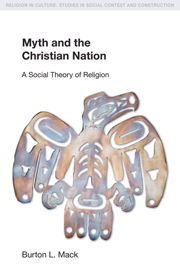Book contents
- Frontmatter
- Contents
- Dedication
- Preface
- Introduction
- Part I The Religions of Other Peoples
- Chapter 1 Looking for Religion in the New World
- Chapter 2 Noticing Social Interests in Myths and Rituals
- Chapter 3 Watching Myths in the Making
- Chapter 4 Thinking with Myths about Culture
- Part II The Religion of Christianity
- Conclusion
- Bibliography
- Index
Chapter 3 - Watching Myths in the Making
from Part I - The Religions of Other Peoples
- Frontmatter
- Contents
- Dedication
- Preface
- Introduction
- Part I The Religions of Other Peoples
- Chapter 1 Looking for Religion in the New World
- Chapter 2 Noticing Social Interests in Myths and Rituals
- Chapter 3 Watching Myths in the Making
- Chapter 4 Thinking with Myths about Culture
- Part II The Religion of Christianity
- Conclusion
- Bibliography
- Index
Summary
In the popular understanding religion is defined by a belief in gods. In our study of the scholars’ search for religion among tribal peoples we have not encountered many gods. Instead, we have noticed social interests and the many ways in which these interests have been recognized in myths and treated in rituals. We are now ready to take another step or two in our quest for a social theory of religion. We need to notice that, instead of gods, tribal peoples sometimes told stories about animals or other features of the natural world as if they behaved like humans and/or might be taking interest in the human world. We need to describe what can be called the mythic imagination. We need to account for the emergence of what we think of as gods in the imaginary worlds of myth, and the sense of exchange with influential forces in the performance of rituals.
We will begin with a description of the mythic imagination as the world in which the gods can be located. This will draw upon the illustrations of myths and social interests given in the last chapter, working mainly with examples from ethnography. Then, however, it will be possible to shift our focus to the aristocratic empires of antiquity in order to show how a world of the gods was created in the mythic imagination and given cosmic dimensions.
- Type
- Chapter
- Information
- Myth and the Christian NationA Social Theory of Religion, pp. 82 - 119Publisher: Acumen PublishingPrint publication year: 2008



